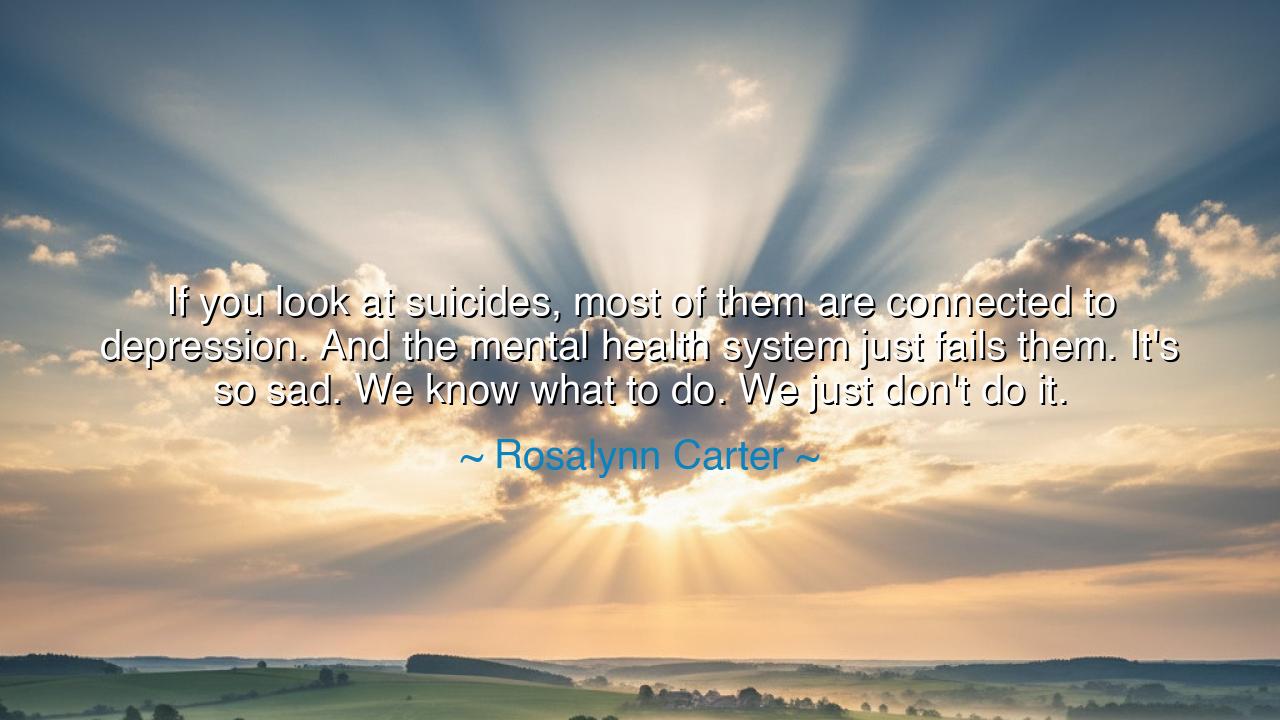
If you look at suicides, most of them are connected to
If you look at suicides, most of them are connected to depression. And the mental health system just fails them. It's so sad. We know what to do. We just don't do it.






There are sorrows in life that are hidden yet immense, silent yet devastating, and few words capture their weight more poignantly than those of Rosalynn Carter: “If you look at suicides, most of them are connected to depression. And the mental health system just fails them. It's so sad. We know what to do. We just don't do it.” In these words lies a lament both personal and societal, a recognition that human suffering is often visible, knowable, and yet left unaddressed. The tragedy of preventable loss underscores the fragility of life and the responsibility borne by communities to intervene.
Carter’s observation emphasizes the intimate link between depression and despair. For millennia, humans have grappled with the hidden burdens of the mind. In ancient Greece, melancholia was considered both a natural and profound state of reflection, yet also a danger when left unchecked. Physicians such as Hippocrates observed that mental imbalance could lead to self-destruction if untreated. Carter reminds us that the same principle persists: untreated depression can escalate into the irrevocable act of suicide, yet modern society, with its knowledge and resources, often fails to intervene effectively.
The sadness she identifies is compounded by the failure of institutions designed to protect and heal. Mental health systems exist to offer guidance, care, and support, yet structural inadequacies—underfunding, stigma, lack of access—leave many to suffer in silence. Ancient philosophers and healers recognized the moral imperative of community: it is not enough to treat the body while neglecting the mind. Carter’s words echo this ancient wisdom: the failure to act in the face of suffering is itself a moral and social tragedy.
History offers painful illustrations. Consider Vincent van Gogh, whose brilliant mind was shadowed by profound depression. Despite interactions with physicians and friends, he lacked the sustained support necessary to navigate his mental anguish. His eventual suicide reveals a chilling truth: genius, talent, and knowledge of treatment mean little if society fails to provide consistent care and understanding. Carter’s lament resonates with this historical lesson: knowledge without action is insufficient.
Carter also underscores the paradox of awareness and inaction. Humanity has learned how to treat depression, how to offer therapy, medication, and support systems, yet too often these measures are underutilized or inaccessible. Ancient moral philosophers stressed that knowing the good is insufficient without doing the good. The wisdom of the ages affirms her point: ethical responsibility demands action, not merely understanding. When we “know what to do” and do not, the cost is measured in lives and grief.
There is also a lesson in the universality of empathy. Depression and suicide are not distant phenomena; they touch every community, family, and individual. By acknowledging this, Carter calls us to cultivate vigilance, compassion, and readiness to intervene. Ancient civic teachings emphasized the duty of each citizen to protect the vulnerable. Today, this extends to recognizing and supporting those struggling with mental illness, to ensure that knowledge of treatment translates into practical care and human connection.
From her reflection emerges a profound and practical lesson: society must act decisively where it already understands the path to healing. Awareness of mental health needs, provision of accessible care, and the dismantling of stigma are moral imperatives. Inaction is not merely bureaucratic; it is tragic, leaving those in despair isolated and unheard. Carter’s words remind us that the capacity to prevent suffering lies within reach, yet requires the courage and commitment to act.
Thus, let Rosalynn Carter’s wisdom guide hearts and hands: seek to understand, yes, but more importantly, seek to intervene, to connect, to care. Support friends, neighbors, and strangers with openness, vigilance, and practical assistance. Build systems, advocate for resources, and cultivate empathy that moves beyond awareness into action. In doing so, we honor the lives of those at risk, transform sorrow into compassion, and fulfill the age-old imperative to protect and preserve the fragile gift of life.






AAdministratorAdministrator
Welcome, honored guests. Please leave a comment, we will respond soon